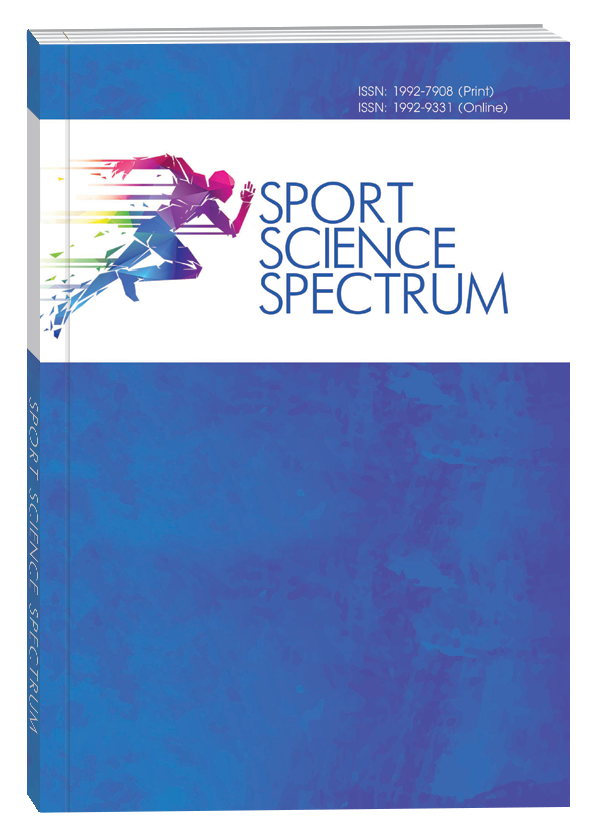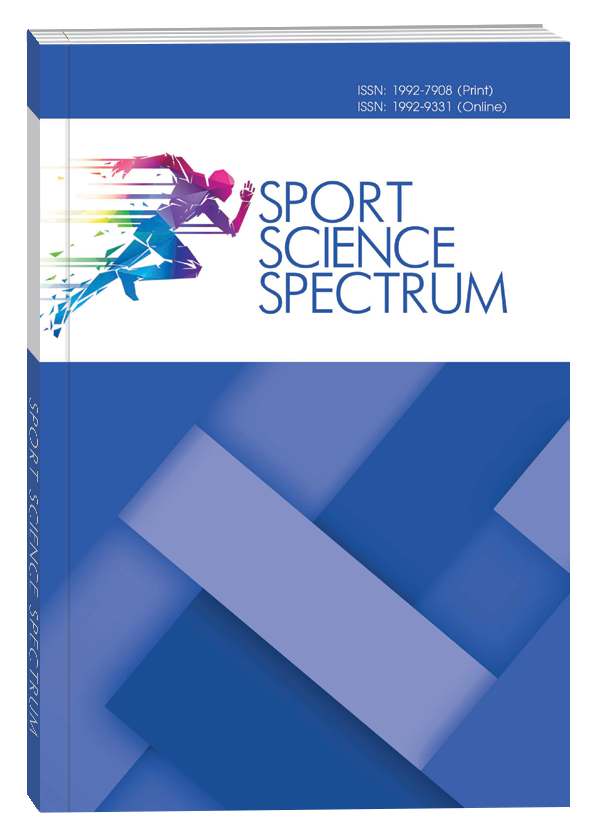THE RELATIONSHIP BETWEEN SELF-ASSESSMENT AND OBJECTIVE INDICATORS OF PHYSICAL FITNESS OF STUDENTS OF HIGHER EDUCATION: A COMPARATIVE ANALYSIS
DOI:
https://doi.org/10.32782/spectrum/2025-1-8Keywords:
students, physical fitness, motor skills, self-esteem, physical education, applicants for higher educationAbstract
Introduction. The article investigates the dependence of the level of physical fitness of applicants for higher professional education on their specialization, as well as the relationship between subjective self-assessment and objective indicators of physical abilities.The purpose of the study. To analyze the relationship between self-assessment and objective indicators of physical fitness of students of higher education and to carry out their comparative analysis.Results. The analysis of the results of test exercises among students of three colleges revealed that students of sports specialization (College 1 and College 2) demonstrate higher objective indicators compared to students of College 3. Using the GLM model (F = 65.02; p < 0.05; R² = 0.648), it was found that the difference between subjective and objective assessments is determined by: actual indicators of physical fitness (flexibility, strength, endurance, agility), self-esteem of the physical self, gender and college affiliation. It was found that better objective results reduce the “delta” (the difference between the scores), while an overestimated general self-esteem (β = 0.70) increases it.Conclusions. The developed GLM-model (F = 65.02; p < 0.05; R² = 0.648) demonstrated a significant influence of such factors as actual indicators of physical fitness (flexibility, strength, endurance, agility), self-esteem of physical “I”, gender and belonging to a particular college on the difference between subjective and objective assessments.
References
1. Андрєєва, О. В., Дудко, М. В., Мартин, П. М., Єракова, Л. А., Соботюк, С. А., Князєв-Шевчук, А. А. Рівень рухової активності, самооцінки фізичної підготовленості та фізичної працездатності учнівської молоді у сучасному вимірі. Науковий часопис Національного педагогічного університету імені М. П. Драгоманова. Сер. Науково-педагогічні проблеми фізичної культури (фізична культура і спорт). 2024; Вип. 11 (184). С. 13–18.
2. Гуменюк О. Є. Психологія Я-концепції : навч. посіб. Тернопіль : Економічна думка, 2004. 310 с.
3. Десі Е. Л., Райан Р. М. Сприяння оптимальній мотивації та психологічному благополуччю в різних сферах життя. Канадська психологія, 2008. 49 (1), 14–23.
4. Криворука Є. В., Лупійко Л. В. Теоретичний аналіз образу фізичного «Я» у психологічній науці. Наукові перспективи, № 10 (52) 2024, С. 86-89. https://doi.org/10.52058/2708-7530-2024-10(52)
5. Круцевич Т., Марченко О. Самооцінка особливостей та адекватності фізичного розвитку молодих чоловіків міста та села. Фізичне виховання, спорт і культура здоров’я у сучасному суспільстві, 2 (54) 2021, С. 69–78. https://doi.org/10.29038/2220-7481-2021-02-69-78
6. Левицька І. М. Вплив образу фізичного «Я» на самоставлення та розвиток особистості у ранньому юнацькому віці. Молодий вчений. 2017. № 3. С. 267–271. http://nbuv.gov.ua/UJRN/molv_2017_3_64
7. Ліпковська Ю. Формування адекватної самооцінки у школярів. Психологічні виміри культури, економіки, управління. 2016. № 9. С. 61–69.
8. Марченко О. Ю. Теоретико-методологічні основи гендерного підходу до формування аксіологічної значущості фізичної культури школярів: монографія. Переяслав-Хмельницький : Домбровська Я. М.; 2018. 292 с.
9. Марченко О. Ю., Москаленко О. В. Дослідження самооцінки фізичного розвитку спортсменів в контексті гендерного підходу. Спортивна медицина, фізична терапія та ерготерапія. Науково-теоретичний журнал. 2023. № 2, С. 43–48 https://doi.org/10.32652/spmed.2023.2.100-104
10. Марш, Х.В., Шавельсон, Р. Я-концепція: її багатогранна ієрархічна структура. Педагогічний психолог, 1985. 20 (3), 107–123. https://doi.org/10.1207/s15326985ep2003_1
11. Онуфрієва Л. А. Самооцінка як складова Я-концепції майбутніх фахівців. Проблеми сучасної психології. 2013. Вип. 22. С. 396–412.
12. Поспелова І. Д., Косьянова О. Ю. Психологічні основи підготовки психологів до формування позитивного образу Я-фізичного у підлітків. Science and Education, 2017, Issue 11. Submitted on September, 06, 2017. С. 60–64. https://doi.org/10.24195/2414-4665-2017-11-7
13. Філософський енциклопедичний словник / уклад. НАН України, Ін-т філософії імені Г. С. Сковороди; [редкол.: В. І. Шинкарук (голова) та ін.]. Київ: Абрис, 2002. VI, 742 с.
14. Фурман А. В., Гуменюк О.С. Психологія Я-концепції : навч. посіб. Львів : Новий світ-2000, 2006. 360 с.
15. Byshevets N, Andrieieva O, Goncharova N, Shynkaruk O, Hakman A, Usuchenko Vi, Synihovets I. General regression modeling of the impact of physical activity on stress-related states in higher education students during military conflict. Journal of Physical Education and Sport ® (JPES), 2024, Vol. 24 (issue 9), Art 239, pp. 1147 – 1158.
16. Deci, E. L., & Ryan, R. M. The “what” and “why” of goal pursuits: Human needs and the self-determination of behavior. Psychological inquiry, 2000. 11(4), 227–268.
17. Fox, K. R. The physical self-perception profile manual. Human Kinetics, Champaign, 1997. Р. 111–140
18. Fox, K. R., & Corbin, C. B. (1989). The Physical Self-Perception Profile: Development and Preliminary Validation. The Physical Self-Perception Profile: Devlopment and Preliminary Validation. December 1989 Journal of Sport and Exercise Psychology 11(4):408–430 DOI:10.1123/jsep.11.4.408.
19. Holland, G., & Tiggemann, M. (2016). A systematic review of the impact of the use of social networking sites on body image and disordered eating outcomes. Body Image, 17, 100–110.
20. Kashuba V, Stepanenko O, Byshevets N, Kharchuk O, Savliuk S, Bukhovets B, Grygus I, Napierała M, Skaliy T, Hagner-Derengowska M, Zukow W. The Formation of Human Movement and Sports Skills in Processing Sports-pedagogical and Biomedical Data in Masters of Sports. International Journal of Human Movement and Sports Sciences. 2020;8(5):249–257. DOI: 10.13189/saj.2020.080513.
21. Swami, V. Body image in emerging adults. У J. J. Arnett (Ed.), Oxford handbook of emerging adulthood, 2016. Pp. 401–417. Oxford University Press.
22. Tiggemann, M. Sociocultural perspectives on body image. У T. F. Cash & L. Smolak (Eds.), Body image: A handbook of science, practice, and prevention. 2011. 2nd ed., pp. 12–20. Guilford Press.





